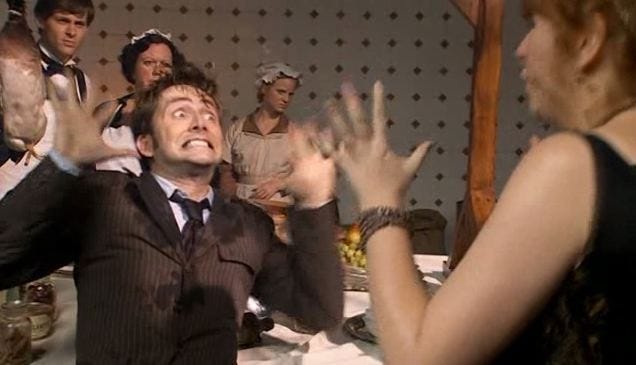I find myself in the difficult position of being someone who adored Doctor Who as a teenager and continues to, but has gotten two English degrees since, worked as a reviewer for three years, and generally grew up. As a result, I have suffered a loss of critical innocence.
I am now challenging myself to go back to parts of New Who I once watched uncritically as a teenager (also while on a treadmill) repeatedly, and trying to watch and review it critically. Currently I’m just working on Series 6, which is perhaps one of the hardest to do: it’s one of the most narratively convoluted and also, in my opinion, one of the most uneven seasons in quality of the show’s revival (which is a criticism that acknowledges the presence of some absolutely phenomenal episodes). I’m doing this as part of a project with my friend Brogan Smith who runs the Substack “Consequitur”—we are planning to each write about topics we know things about but have differing opinions on. I think I’ve got that right, I might not. I’ll check with him after I publish this.
I’m finding myself awash with thoughts about the project of this project itself as I watch through Series 6 and take notes, so I thought I’d publish these to start. I also am currently unable to work on large projects without some mid-project pseudo-completion dopamine.
I’m being reminded during the process of watching Doctor Who critically that just accepting the timely-wimeyness and constant Moffat “new rules” is SO much easier than watching for and picking apart plot holes. I also find myself slipping into enjoying the show too much to pay as close attention as I should as I attempt to be critical. Maybe that’s the key thing at the end of the day… but a show that requires that you not pay attention to enjoy it, especially such a rule-based one, is probably doing something wrong, even if there’s something to give a show credit for if it can successfully distract you enough in the first place to prevent you from paying attention.
I’m currently on “The Doctor’s Wife,” which despite being the awesome Neil Gaiman-written and fan art-friendly episode that it is, is actually unrelated to the series arc around Demon’s Run, Amy’s pregnancy, and the mystery of River Song.
My thought about the series at this point is that it’s trying to balance a lot of goals: it has to be this emotionally poignant work of relevant, insightful science fiction in some episodes, while also being fun and goofy in others. There is a part of me that asks “who are the standalone fun and goofy episodes for? Isn’t it possible to do both in the same story?”, but I think that it’s not reasonable to say that Doctor Who should stop having fun and goofy episodes unrelated to the main arc of the story. I guess I’m defining that category as episodes that rely more on awe and comedy than scariness, and also aren’t crucial parts of the respective season arc.
After all, New Who has given us quality episodes in this category in the form of “Smith and Jones,” “Partners in Crime,” “The Unicorn and the Wasp,” “The Power of Three,” “The Bells of Saint John,” and “Flatline,” to name the standouts across series 1-8.
I also think it’s probably a bad idea to tell a show that relies so much on creativity and spontaneity for its best ideas that it should avoid the entire genre of light whimsy. Further, the more serious episodes rely so much on comedy, or at least Doctor Who’s brand of comedy. But why is it so hard to write a goofy episode of Doctor Who that’s also riveting television? Maybe the unevenness of Series 6 will illustrate this.
I’m coming up on having written reviews for DC Theater Arts for three years, next month. I’m currently three episodes into Series 6 of Doctor Who and I’m realizing how different reviewing one two-hour theater show is to reviewing a season of television. This is a hole in my knowledge and I’m excited to solve it. If you are a Variety editor and read those last two sentences, then I’m hoping that my honest admission of an area for growth represents a plus for me as a candidate rather than an admission of weakness. I truly don’t know what to do on that front at this point besides be thoughtful and honest. So on we go.







"I also am currently unable to work on large projects without some mid-project pseudo-completion dopamine."
Love that. "Bigger on the inside" can describe writing projects, too.